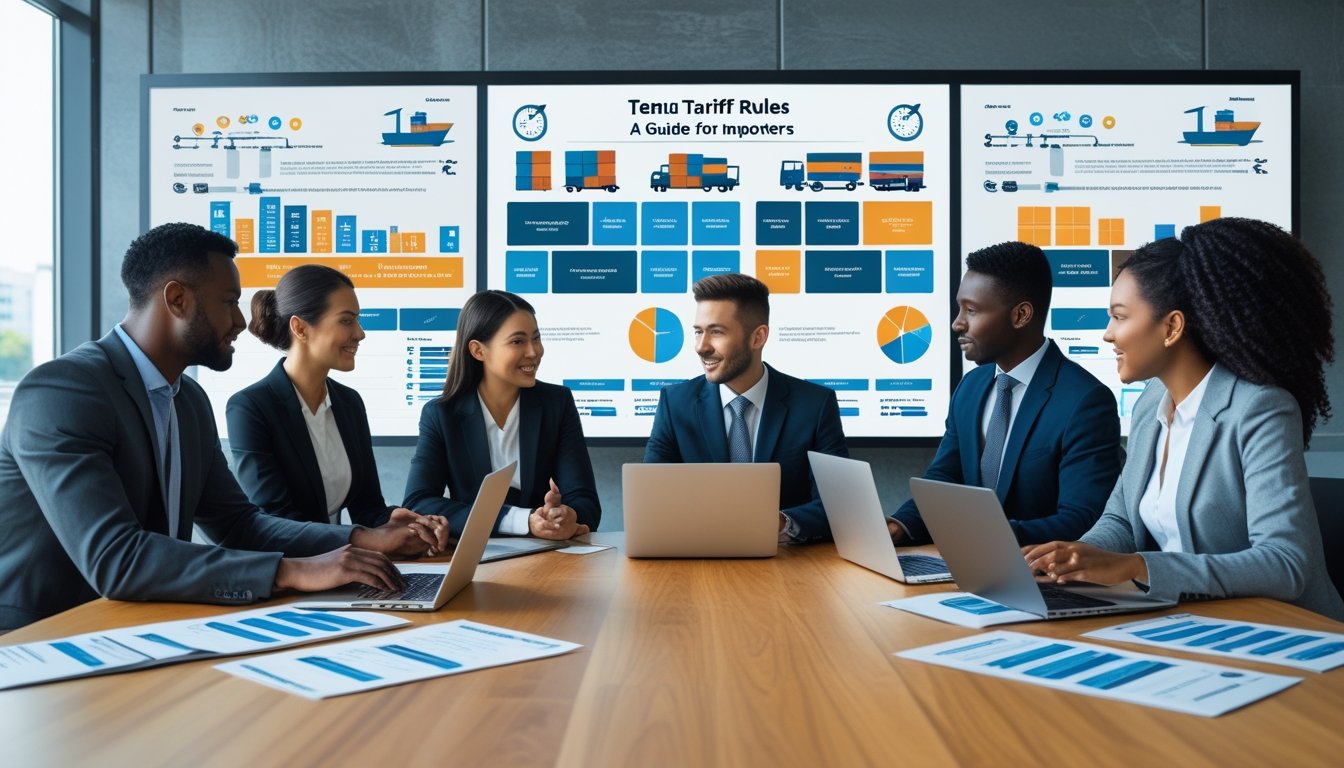The Temu tariff has become a key issue for importers and cross‑border e‑commerce businesses navigating China’s evolving trade landscape. As platforms like Temu expand rapidly, understanding how tariffs apply is crucial for staying compliant and competitive.
For businesses importing goods through Temu, the tariff rules can directly affect pricing, profit margins, and overall market strategy. Even small missteps in compliance may result in delays, penalties, or unexpected costs.
This guide breaks down the essential tariff rules importers need to know, offering practical insights into compliance requirements and strategies to manage risks effectively.
Want to understand the broader legal framework shaping business in China? Check out our guide to the 10 Laws in China that every company should know.
Overview Of The Temu Tariff

Knowing how tariffs hit Temu orders, the legal stuff behind them, and which agencies pull the strings is crucial. These rules decide what you pay, how your goods get classified, and whether you catch a break or get stuck with extra duties.
Definition And Legal Background
So, tariffs are basically taxes on stuff you bring in from another country. For Temu, that means tariffs kick in when products ship from China to the U.S. or elsewhere. After the latest policy shakeup, these taxes can really bump up your final costs.
Many Temu orders currently avoid duties under the U.S. de minimis exemption for packages valued under $800. However, lawmakers are considering changes that could limit or remove this benefit, especially for platforms like Temu and Shein. If that happens, more shipments will face tariff reviews.
Tariff rates jump around depending on the product. Electronics, clothes, housewares—they all get different percentages. And with new “reciprocal tariffs” stacked on top, figuring out your real cost isn’t exactly straightforward anymore.
Key Regulatory Authorities In China
When you order from Temu, Chinese export controls process your package before it ever leaves the country. The General Administration of Customs of China (GACC) handles classification, valuation, and export clearance. They make sure goods line up with both local and international trade rules.
The Ministry of Commerce (MOFCOM) shapes tariff policy by hammering out trade agreements and responding to foreign tariff moves. If the U.S. jacks up tariffs, MOFCOM might tweak export policies or subsidies, which can mess with Temu’s pricing.
Agencies like the State Administration for Market Regulation (SAMR) set product standards and labeling rules. If your goods don’t check those boxes, they can get stuck or blocked at customs. You’re counting on Temu to get this right so your shipment doesn’t run into trouble.
Applicability To Cross-Border E-Commerce
Temu runs as a cross-border e-commerce platform, so tariff rules hit especially hard. Unlike U.S. sites, Temu ships most stuff straight from Chinese warehouses or bonded zones. That means your orders get treated as imports and fall under customs regulation.
With the U.S. dropping the de minimis exemption, the math on Temu orders changed. Even little purchases can get dinged with duties, so those low sticker prices might not save you as much as you thought. Tariffs get added at the border, and carriers might tack on handling fees for customs paperwork.
To work around this, Temu started using U.S.-based warehouses for some products. If you buy something already stored in the U.S., it’s cleared customs, so you skip extra duties. But if it ships directly from China, you’re still on the hook for tariffs. It’s worth checking where your item ships from before you hit “buy.”
Curious about how tariffs fit into the bigger trade picture? Read our latest analysis on US‑China Trade Relations 2025 and what it means for importers.
Compliance Requirements For Importers
Importing through Temu means you’ve got to pay close attention to customs rules, paperwork, and your actual tariff responsibilities. Messing this up can lead to higher costs, delays, or even fines—none of which you want eating into your profits.
Documentation And Customs Declarations
Every shipment needs full, accurate paperwork: invoices, packing lists, bills of lading, and customs declarations. Each one has to spell out the product description, country of origin, and declared value. Leave something out or get sloppy, and you’re asking for trouble.
U.S. Customs and Border Protection (CBP) expects you to use reasonable care when prepping these records. If you miss something or fudge the details, your shipment might get flagged, delayed, or even audited.
Temu, which is run by PDD Holdings, now leans on U.S. fulfillment centers to dodge some risks tied to direct imports. Still, you’re on the hook for making sure all paperwork filed under your name or business is spot-on.
It’s smart to keep digital and paper copies of everything for at least five years—CBP might want to see them if they audit you. Having organized records also saves you headaches if a dispute pops up.
Tariff Rates And Calculation Methods
Most imports get hit with tariffs, so knowing how they’re figured out helps you budget. Currently, shipments valued under $800 may qualify for the de minimis exemption, but proposed trade measures could change this, especially for Temu and Shein. If the exemption is restricted, even low‑value shipments could face tariffs. Rates vary widely depending on product classification under the Harmonized Tariff Schedule (HTS), and some items may also face additional Section 301 tariffs, anti‑dumping (AD), or countervailing duties (CVD).
Tariffs depend on the Harmonized Tariff Schedule (HTS)
Some stuff also gets slapped with Section 301 tariffs, anti-dumping (AD), or countervailing duties (CVD). These stack on top of regular duties and can make your costs skyrocket. Getting classification and calculation right keeps nasty surprises off your bill.
Common Pitfalls And Penalties
Plenty of importers get tripped up by undervaluing shipments, misclassifying products, or not listing the right country of origin. Even if it’s an honest mistake, CBP treats these as compliance violations.
CBP can audit your records for up to five years. If they find issues, you could get fined, lose your shipment, or even have your import privileges pulled. Trying to dodge the new Temu tariff rules? That’s a fast track to penalties.
Another trap: leaning too much on suppliers for compliance info. Temu might give you some details, but you’re the one legally responsible for accuracy. Working with licensed customs brokers and doing regular internal checks keeps you safer.
Need tailored advice on how the Temu tariff and U.S. import rules affect your business? Contact the team at China Legal Experts for professional guidance on compliance, customs, and cross‑border trade.
Practical Strategies For Businesses

If you want to soften the hit from tariffs, plan ahead, pick smart supply chain routes, and get help from folks who know customs inside out. These moves help you control your costs, stay competitive, and avoid annoying delays.
Minimizing Tariff Risks
Start by double-checking your product classifications in the Harmonized Tariff Schedule. If you get it wrong, you could pay more or face penalties. Keeping your product data tight helps avoid customs headaches.
Don’t put all your eggs in one basket. Sourcing from just one country leaves you wide open to sudden tariff spikes. Spread out your sourcing so you’re not caught off guard.
It’s worth asking suppliers if they’ll share some of the tariff pain. Some might lower prices or split fees, which can help keep your margins from getting squeezed.
Checklist for minimizing risks:
- Check product codes and descriptions
- Keep up with U.S. trade policy changes
- Look for suppliers in countries with lower tariffs
- Negotiate with vendors to offset costs
Leveraging Free Trade Zones
Free Trade Zones (FTZs) let you store, process, or repackage goods before they hit the U.S. market. You don’t pay duties until stuff leaves the FTZ for sale here. If you re-export, you might skip tariffs entirely.
For bulk importers, FTZs can ease cash flow strain since you pay duties only when you sell. That makes inventory a bit less stressful to manage.
You can also relabel or assemble products inside an FTZ. Sometimes, that move gets you a lower tariff rate. It takes careful compliance, but the savings can add up.
Benefits of FTZ use:
- Defer or skip duties
- Better inventory control
- Lower distribution costs
- More flexibility with tariff classification
Working With Licensed Customs Brokers
Customs brokers know the rules and help you sidestep expensive mistakes. They handle the paperwork, calculate duties, and keep you in line with U.S. Customs and Border Protection.
Letting a broker take care of the complex stuff saves you time and lowers the odds of shipment delays. If you’re new to a market, their advice on changing tariff rules is gold.
Brokers often know when your products qualify for reduced rates or exemptions. That inside info can cut your costs while keeping you compliant.
What a broker provides:
- Spot-on tariff classification
- On-time customs filings
- Regulatory updates
- Tips on lowering your duty bill
If your business touches on travel or hospitality, don’t miss our overview of the Tourism Law in China and its impact on foreign operators.
Conclusion: Temu Tariff
The Temu tariff is no longer optional for importers who want to succeed in China’s fast‑moving e‑commerce environment. Clear knowledge of the rules can help businesses avoid costly penalties and maintain smooth supply chains.
By staying informed on tariff regulations and working with trusted partners, importers can reduce risks while maximizing opportunities in cross‑border trade. Proactive compliance is not just about meeting legal obligations—it is a strategic advantage.
For a broader view of how the temu tariff connects with global trade, explore our article on the 2025 Import Tax from China to USA.
Frequently Asked Questions: Temu Tariff
The latest tariff changes have shaken up how goods move from China to the U.S. If you’re wondering how this affects Temu, what happens when you order from China, or why certain tariffs exist, you’re not alone.
Is Temu affected by tariffs?
Yes. Temu orders shipped directly from China are subject to tariffs if they exceed $800 in value. While many small packages currently qualify for the de minimis exemption, U.S. policymakers are debating whether to restrict this rule for platforms like Temu.
Do I pay tariffs if I order from China?
If your order ships from China, you’re probably facing tariffs or import charges. Since the rules changed, even small packages under $800 can get taxed. Temu’s trying to blunt the impact with domestic fulfillment, but some stuff will still cost extra.
Why is there a 100% tariff on Chinese cars?
In 2024, the U.S. slapped a 100% tariff on Chinese-made electric vehicles. The idea was to limit competition from Chinese automakers, who get a lot of subsidies, and to protect U.S. car makers. This only applies to vehicles—not regular consumer goods.
Is the US tariff 245% on China?
No, the U.S. does not apply a flat 245% tariff on all Chinese imports. Tariff rates depend on the product. Some goods face standard duties, while others may be subject to additional Section 301, AD, or CVD duties that can push rates much higher. For example, Chinese electric vehicles currently face a 100% tariff.
Subscribe to receive updates
Subscribe to receive the latest blog posts to your inbox every week.





